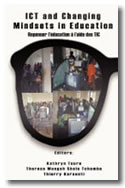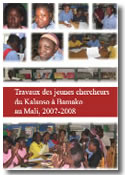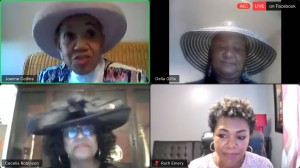African American Women in the Suffrage Movement: Then, Now, and Forever July 14, 2020
Kansas City, Missouri, July 11, 2020 – Clay County African American Legacy (CCAAL) Inc. and the League of Women Voters of Kansas City/Jackson-Clay-Platte counties co-organized a panel discussion on African American Women in the Suffrage Movement. Originally planned as an in-person event with a brunch in March 2020, due to covid19, it was held on July 11, 2020 via Zoom and Facebook live.
The featured speaker, joining in from Tulsa, Oklahoma, was Dr. Delia Gillis, Professor of African American History at the University of Central Missouri, in Warrensburg. The theme of her presentation was about the African American woman learning that politics “meddle constantly with her and hers.”
Dr. Gillis began by referring to the 1998 groundbreaking book, African American Women in the Struggle for the Vote, 1850-1920, by Rosalyn Terborg-Penn. She was Professor of History at Morgan State University in Baltimore and founder of the Association of Black Women Historians. She just died in December 2018.
Elsa Barkley Brown wrote about women after and during the reconstruction period in the United States. After the Civil War, in 1870, suffrage was extended to African American men, via the 15th Amendment, which prohibited sates from denying a male citizen the right to vote based on “race, color or previous condition of servitude.” African American women exercised their soft power at that time to ensure that the vote of men made a difference for the community.
Dr. Gillis went on to describe African American women who made their mark during the suffrage movement. Maria Stewart was a journalist, educator, abolitionist, and women’s rights activist. She spoke at the African Meeting House in Boston.
Many people are aware of the pivotal and multifaceted work of journalist and activist Ida Bell Wells-Barnett. Ida B. Wells stressed that “the way to right wrongs is to turn the light of truth upon them.” She was an advocate of empowerment and fought social injustice at every turn. In her early days, she put up her hair up and lied about her age to become a teacher. When she was thrown off a first-class train despite having a ticket, she filed a lawsuit and won at the local level, though the case was overturned at higher levels. Long before equal rights activist Alice Paul went to England, Ida B. Wells went to England to plead the cause of women. She was a colleague and peer of American social reformer and women’s rights activist Susan B. Anthony. “We need to look at the whole career of Ida B. Wells. She impacted this country in profound ways,” said Dr. Gillis. Dr. Gillis was inspired how Ida B. Wells took her children to meetings, and Dr. Gillis did the same while working on her PhD.
Ida B. Wells founded the Alpha Suffrage Club in Chicago, after women in Chicago were given the right to vote in 1910. The club members agitated and advocated – because power does not concede without a demand. They registered black women to vote and instructed them in the vote.
Racism reared its ugly head at the 1913 Women’s Suffrage Parade. Alice Paul organized the parade. Women went with their delegations to Washington, DC to march. However, Ida B. Wells, though she was part of the movement for longer than many others, was denied the right to march like others. She nonetheless ended up joining the Chicago delegation in the march. About a year later, she founded a suffrage club supporting the right of all women to vote.
The insistence of Ida B. Wells is reminiscent of what Anna Julia Cooper wrote in A Voice from the South in 1892: that “only the BLACK WOMAN can say when and where I enter […] and there the whole Nero race enters with me.” Cooper insisted how women will not rise if all women do not rise above division. Political expediency harmed the suffrage movement over the long term.
Voting is not the only issue on which African American women worked. Nannie Helen Burroughs (1979-1961), an educator, was active in the African American Baptist Convention, the suffrage clubs, and several other organizations, including the National Association of Colored Women, which had the motto of “Lifting as we climb.” Burroughs advocated through her life for equal rights and for women’s work beyond domestic responsibilities.
Besides education and the vote, African American women were also involved in anti-lynching efforts. Despite the building of schools and institutions and literacy rates among African Americans having gone from 20% in 1870 to 80% in 1920 and 1930, racialized violence was the order of the day.
It is now well known that Blacks were massacred in Greenwood in Tulsa, Oklahoma in 1921. Today, 99 years later, if activists wrote “Black Lives Matters” on the streets in Greenwood, it shows that staying alive is still a struggle. This is now a matter of concern for the entire nation. Voting is part of what will make the needed changes.
Despite the hard-won right to vote, via the 19th amendment, women continued to struggle to exercise their right to vote. See Illusion of Suffrage by Ronnie L. Podolefsky about the Southern poll tax, which had to be paid to register to vote. Even white women were disenfranchised through poll taxes.
“Today we still have important questions to ask,” affirmed Dr. Gillis. “Do we have the vote, even since the Voting Rights Act of 1965? Can we exercise it in a way that is meaningful? Is voting in 2020 a reality for African Americans?”
Fannie Lou Hammer (1917-1977), in the 1940s and 1950s was a timekeeper on a plantation. In the 1960s, she risked her life to register and exercise her right to vote in Mississippi. She also challenged decision-making processes of the Democratic National Convention (DNC).
In Nasty Women and Bad Hombres, see chapter 22:“’When they go low, we go high’: African American women torchbearers for democracy and the 2016 Democratic National Convention,” by historians De Anna J. Reese and Delia C. Gillis.
African American women, more than any other group, participate in democracy, but with too few returns. But it is not a hollow victory, because of the communal value of the efforts. Donna Brazile as interim chair of the DNC had the role to ensure that it spoke to the diversity of the democratic party. African American women voted in the highest percentages in the 2018 elections. They were persistent.
The ongoing fight for the vote requires ongoing persistence. Women work as jurors, canvassers, poll workers and more. “Men may be in the lead, but women are organizing. Look behind the people in front,” said Dr. Gillis in concluding.
[…]
Which women, then and now, inspire the panelists, and Why?
Joanne Collins (former Kanas City Council member and mayor pro-tem) said she is inspired by today’s young people. She takes the time to mentor young women and encourage them to take on leadership roles. She particularly enjoys working with young women who have done sports and taken drama. “They have learned collaboration and communication,” she said. Going back in history, she said she is inspired by Mary Church Terrell (1863-1954), the first African American woman to be appointed to serve on a school board in a major U. S. city. She was a member of numerous organizations, the first President in 1896 of the National Association of Colored Women, and a founding member in 1910 of the National Association of College Women, now the National Association of University Women. She apparently had a supportive spouse. His judgeship lent her credence and contacts. “It is important that we recognize, in recruiting women to run for office and to take on leadership roles, the important role a spouse plays in being supportive,” said Joanne Collins.
Cecelia Robinson (Emeritus Professor of William Jewell College) said she finds Ida B. Wells inspirational, because of her many talents. She was a writer and was engaged in so many different ways. “If she were alive today,” said Dr. Robinson, “she would be involved in the Black Lives Matter movement. The whole country is involved and is reacting to what happened to George Floyd. Knowing how Ida B. Wells fought oppression, hatred, lynching, and racism, I know she’d be out there today.”
Ruth Emery (cofounder and past President of Clay County African American Legacy (CCAAL) Inc.) said she finds inspiration in all the women suffragists and could not choose a favorite. “It is their drive to make change that inspires me,” she said.
Delia Gillis said she is inspired by how black women mayors in the United States have reacted during the pandemic. “They, along with the founders of the Black Lives Matter movement, are who inspire me today,” she said.
[…]
See the full article and a link to the recording of the event at: www.kathryntoure.net/wp-content/uploads/2020/07/African-American-Women-in-the-Suffrage-Movement-KC-2020-v4.pdf



